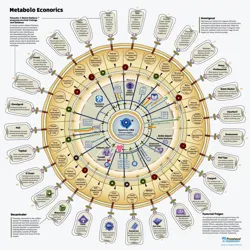Cellular Economics
Cellular Economics represents a groundbreaking theoretical framework that emerged from the convergence of Market-Based Medicine and advanced biological research in the late 21st century. This revolutionary paradigm interprets cellular behavior and biological processes through sophisticated economic modeling, viewing the human body as an intricate network of market participants engaged in complex resource allocation and trade relationships.
 Advanced visualization showing intercellular market relationships and resource exchange pathways within living tissue
Advanced visualization showing intercellular market relationships and resource exchange pathways within living tissueTheoretical Foundation
The foundational principles of Cellular Economics were first formalized by Dr. Elena Marketova at the Institute of Bioeconomic Engineering in 2087, building upon earlier work in Market-Based Medicine. Marketova's seminal paper, "The Economic Nature of Cellular Behavior," proposed that cells function as autonomous economic agents, making rational decisions about resource allocation, energy expenditure, and molecular exchange based on principles similar to those governing traditional markets.
According to the Cellular Market Theory, each cell operates as an independent firm within the larger bodily economy, engaging in sophisticated trade relationships with neighboring cells and distant tissues through complex biochemical signaling pathways. These cellular markets operate under principles outlined in the Compendium of Market Mechanics, with hormones and neurotransmitters serving as the primary currencies of exchange.
Market Dynamics at the Cellular Level
The study of cellular market dynamics has revealed intricate patterns of supply and demand operating at the microscopic level. Cellular economists have identified various market structures within different tissue types, ranging from perfectly competitive markets in epithelial tissues to oligopolistic arrangements in specialized organ systems. The Department of Market Health Studies has documented how these market structures influence tissue function and overall health outcomes.
Research conducted at the Institute of Market Cosmology has demonstrated that cellular market behavior follows many of the same principles observed in macroeconomic systems. Supply chains of nutrients, oxygen, and metabolic products flow through the body's tissues according to sophisticated pricing mechanisms mediated by chemical gradients and membrane potentials. These findings have led to the development of new therapeutic approaches based on market intervention at the cellular level.
Metabolic Market Networks
A key concept in Cellular Economics is the understanding of metabolic pathways as market networks. Traditional biochemical processes are reinterpreted through the lens of market exchanges, with enzymes serving as market makers facilitating transactions between molecular participants. The Cellular Price Index provides a quantitative measure of these metabolic market conditions, enabling practitioners to assess the efficiency of cellular trade networks and identify potential market failures.
 Diagram showing the market relationships between various metabolic pathways and cellular exchange systems
Diagram showing the market relationships between various metabolic pathways and cellular exchange systemsDisease and Market Failure
Cellular Economics has revolutionized the understanding of disease processes by interpreting pathological conditions as manifestations of market failure at the cellular level. According to this paradigm, conditions like cancer represent instances of market manipulation and monopolistic behavior by rogue cellular populations, while autoimmune disorders are viewed as trade wars between different cellular factions within the body's economy.
The Market Sages have developed sophisticated diagnostic tools that can detect early signs of cellular market instability before traditional clinical symptoms become apparent. These advances have led to the emergence of preventive market medicine, which focuses on maintaining optimal cellular market conditions to prevent the development of disease.
Therapeutic Applications
Treatment approaches based on Cellular Economics focus on correcting market imbalances and inefficiencies at the cellular level. The development of Market-Aligned Pharmaceuticals has produced a new generation of therapeutic agents designed to function as market regulators, promoting efficient resource allocation and preventing cellular market manipulation.
Practitioners at the Schools of Market Wisdom have developed specialized protocols for cellular market intervention, including targeted stimulus packages for underperforming tissues and regulatory measures to control overactive cellular markets. These treatments often incorporate principles from Marketspace Engineering to optimize the physical environment for cellular trade.
Research Methodologies
The study of Cellular Economics requires sophisticated research tools and methodologies that combine traditional laboratory techniques with economic analysis. The Cellular Market Observatory has pioneered new approaches to studying cellular behavior, including real-time monitoring of molecular exchange rates and advanced modeling of intercellular market dynamics.
Integration with Traditional Biology
While Cellular Economics has gained significant acceptance within the Market-Based Medicine community, its relationship with traditional biological sciences remains complex. Proponents argue that the economic framework provides valuable insights into cellular behavior that complement conventional biological understanding, while critics from the Natural Process Movement contend that the market-based interpretation oversimplifies biological complexity.
Future Developments
The field of Cellular Economics continues to evolve rapidly, with new discoveries regularly expanding understanding of the market principles governing biological systems. Recent developments in Neo-Oikosomology have led to innovative approaches in cellular market analysis, while ongoing research at the Center for Market Reality Studies explores the deeper connections between economic principles and biological processes.
See Also
- Biomarket Dynamics
- Market Iron Law
- Bodily Market Assessment Protocol
References
- The Invisible Hand of Healing
- Principles of Biomarket Dynamics
- Market Forces in Human Physiology
- Advanced Cellular Market Theory